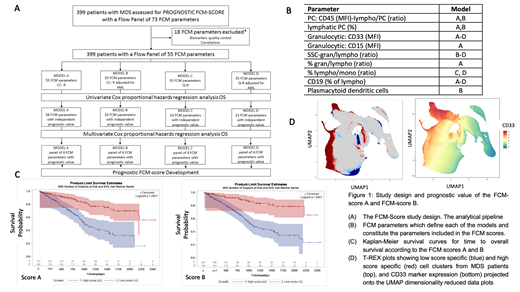Abstract
Introduction: Flow cytometry (FCM) as recommended by European LeukemiaNet (ELN), is a co-criterion in MDS diagnostics. The aims of the present study were (1) to test whether the FCM diagnostic parameters have an impact on overall survival (OS); and (2) a computational algorithm could improve the identification of aberrant expression and/or cell population frequencies with prognostic importance.
Methods: FCM was performed in bone marrow (BM) of 399 patients cytomorphologically classified as MDS. Cell populations were identified based on ELN recommended 55 parameters (Porwit et al., 2014), including: progenitor cells (PC), granulopoiesis (G), monopoiesis (M), nucleated red cells (NRC) and other cells (e.g. lymphocytes). Reference ranges were based on control BM (C-RR) and a quartile analysis (Q-A), to identify the parameters with an optimum separation of overall survival (OS).
OS was assessed following univariate and multivariable Cox proportional hazards regression analysis using log-rank likelihood test: C-RR or Q-A (model A, C) and C-RR or Q-A with adjustment for patients developing acute myeloid leukemia during disease course (model B, D). Multivariate survival analysis, Kaplan Meier curves, and receiver operating characteristic curve (ROC) were used to develop prognostic FCM-scores (FCM-A to D) and tested for their independent prognostic value versus known prognostic parameters (age, sex, IPSS-R) as well as diagnostic FCM-scores (Ogata-, FCSS-, iFS-score). A summary of the analytical pipeline is shown in Figure 1A. Moreover, a sensitivity analysis for TP53 mutation distribution among the scores was performed (n=108) and a reliability analysis exploring the scores distribution among healthy donors (n=77) and MDS (n=399). In addition to expert gating ,T-REX pipeline (Barone, S. et al, 2020) was applied on a subset of patients (n=20) to check the feasibility of using unsupervised machine learning approach in identifying the FCM parameters incorporated in models A-D, and its ability to differentiate between the low (0,1) and high (≥2 ) scored patients.
Results: The multivariable regression analysis identified 9 FCM parameters with independent prognostic impact on OS (detailed in Figure 1B).
Prognostic FCM-scores based on these independent parameters were calculated for each model and dichotomized into high (≥2) and a low (0-1) scores. Thus, FCM-scores A and B, (reference ranges C-RR), outperformed FCM-scores C and D, (reference ranges Q-A): (FCM-A: HR (95 %CI) 3.20 (2.15 - 4.48); FCM-B: 4.08 (2.54 - 6.55); FCM-C: 2.03 (1.40 - 1.84); FCM-D: 2.30 (1.60 - 3.32)), as well as the diagnostic FCM-scores, as Ogata-score, FCSS and iFS (2.00 (1.29 - 3.11); 1.68 (0.99 - 2.86), 1.56 (0.92 - 2.65)). Interestingly, the new prognostic FCM-scores allowed a better prognostic grading than IPSS-R (HR (95 %CI): 2.37 (1.61-3.49)). Kaplan Meier survival curves stratified by FCM-score A and B showed a highly significant overall survival benefit for patients with a low score (p<.0001) (Figure 1C). Of note, performing ROC analysis, the FCM-A and FCM-B scores are independent of known prognostic variables as age, sex and IPSS-R, Area under the curve (AUC): 0.69, and 0.71 vs. 0.47, 0.46 and 0.62. Finally, we could clearly discriminate two prognostic subgroups within the IPSS-R low risk (IPSS-R<3.0) as well as high risk (IPSS-R≥3.0) patients (p<.0001).
The TP53 mutation distribution did not differ among low and high score groups (wtTP53 lowScoreA (48.96%)/high ScoreA (51.04%) vs mTP53 lowScoreA (58.33%)/high ScoreA (41.67%) p>0.054). Healthy donors presented a high proportion of low score distribution (>87%) which differed from the MDS group (HD lowScoreA (90.91%)/high ScoreA (9.09) vs MDS lowScoreA (52.13%)/high ScoreA (47.87%) p<.0001). Additionally the T-REX pipeline was able to identify clear differences in expression of significant parameters between the low and high scoring patients in both model A and B (example of CD33 in Figure 1D).
Conclusion: We have generated two novel prognostic scores based on distinct FCM characteristics which could predict overall survival in MDS patients. FCM-scores A and B discriminate MDS patients with better overall survival outperforming IPSS-R as well as Ogata, FCSS and iFS scores. The T-REX machine learning has independently identified the same differences in models A and B, which highlights the potential of unsupervised approaches for future use in diagnostic FCM labs.
Farzaneh: Autolus: Consultancy, Current equity holder in publicly-traded company. Harrison: Incyte Corporation: Speakers Bureau; Shire: Membership on an entity's Board of Directors or advisory committees, Speakers Bureau; Promedior: Membership on an entity's Board of Directors or advisory committees, Speakers Bureau; Sierra Oncology: Honoraria; Gilead Sciences: Membership on an entity's Board of Directors or advisory committees, Speakers Bureau; Roche: Membership on an entity's Board of Directors or advisory committees, Speakers Bureau; AOP Orphan Pharmaceuticals: Membership on an entity's Board of Directors or advisory committees, Speakers Bureau; Geron: Membership on an entity's Board of Directors or advisory committees, Speakers Bureau; Abbvie: Membership on an entity's Board of Directors or advisory committees, Speakers Bureau; BMS: Membership on an entity's Board of Directors or advisory committees, Speakers Bureau; Keros: Membership on an entity's Board of Directors or advisory committees, Speakers Bureau; Galacteo: Membership on an entity's Board of Directors or advisory committees, Speakers Bureau; Janssen: Membership on an entity's Board of Directors or advisory committees, Speakers Bureau; Novartis: Membership on an entity's Board of Directors or advisory committees, Research Funding, Speakers Bureau; CTI BioPharma: Membership on an entity's Board of Directors or advisory committees, Speakers Bureau; Celgene: Honoraria, Membership on an entity's Board of Directors or advisory committees, Research Funding, Speakers Bureau; Constellation Pharmaceuticals: Research Funding. Platzbecker: Celgene/BMS: Honoraria; Geron: Honoraria; Janssen: Honoraria; Novartis: Honoraria; Takeda: Honoraria; AbbVie: Honoraria. Kordasti: Novartis: Honoraria, Membership on an entity's Board of Directors or advisory committees, Research Funding; Celgene: Research Funding; Alexion: Honoraria; Beckman Coulter: Honoraria.


This feature is available to Subscribers Only
Sign In or Create an Account Close Modal